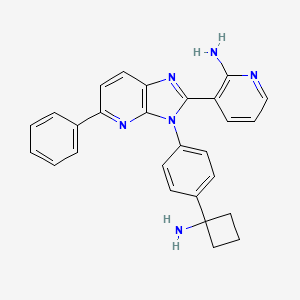m6A-centered Drug Response Information
General Information of the Drug (ID: M6APDG02329)
| Name |
ARQ 092
|
||||
|---|---|---|---|---|---|
| Synonyms |
Miransertib
Click to Show/Hide
|
||||
| Status |
Phase 2
|
||||
| Structure |
 |
||||
| Formula |
C27H24N6
|
||||
| InChI |
1S/C27H24N6/c28-24-21(8-4-17-30-24)25-32-23-14-13-22(18-6-2-1-3-7-18)31-26(23)33(25)20-11-9-19(10-12-20)27(29)15-5-16-27/h1-4,6-14,17H,5,15-16,29H2,(H2,28,30)
|
||||
| InChIKey |
HNFMVVHMKGFCMB-UHFFFAOYSA-N
|
||||
| PubChem CID | |||||
| TTD Drug ID | |||||
Target Gene(s) and Their Upstream m6A Regulator, Together with the Effect of Target Gene(s) in Drug Response
The target genes involved in drug-target interaction (such as drug-metabolizing enzymes, drug transporters and therapeutic targets) and drug-mediated cell death signaling (including modulating DNA damage and repair capacity, escaping from drug-induced apoptosis, autophagy, cellular metabolic reprogramming, oncogenic bypass signaling, cell microenvironment, cell stemness, etc.) could be regulated by m6A regulator(s) and affected their corresponding drug response. You can browse detailed information on drug-related target gene(s) mediated by m6A regulators.
RAC-alpha serine/threonine-protein kinase (AKT1)
Heterogeneous nuclear ribonucleoproteins A2/B1 (HNRNPA2B1)
| In total 1 mechanisms lead to this potential drug response | ||||
| Response Summary | RAC-alpha serine/threonine-protein kinase (AKT1) is a therapeutic target for ARQ 092. The Heterogeneous nuclear ribonucleoproteins A2/B1 (HNRNPA2B1) has potential in affecting the response of ARQ 092 through regulating the expression of RAC-alpha serine/threonine-protein kinase (AKT1). | [1], [2] | ||
Insulin-like growth factor 2 mRNA-binding protein 2 (IGF2BP2)
| In total 1 mechanisms lead to this potential drug response | ||||
| Response Summary | RAC-alpha serine/threonine-protein kinase (AKT1) is a therapeutic target for ARQ 092. The Insulin-like growth factor 2 mRNA-binding protein 2 (IGF2BP2) has potential in affecting the response of ARQ 092 through regulating the expression of RAC-alpha serine/threonine-protein kinase (AKT1). | [2], [3] | ||
Methyltransferase-like 14 (METTL14)
| In total 1 mechanisms lead to this potential drug response | ||||
| Response Summary | RAC-alpha serine/threonine-protein kinase (AKT1) is a therapeutic target for ARQ 092. The Methyltransferase-like 14 (METTL14) has potential in affecting the response of ARQ 092 through regulating the expression of RAC-alpha serine/threonine-protein kinase (AKT1). | [2], [4] | ||
Methyltransferase-like 3 (METTL3)
| In total 1 mechanisms lead to this potential drug response | ||||
| Response Summary | RAC-alpha serine/threonine-protein kinase (AKT1) is a therapeutic target for ARQ 092. The Methyltransferase-like 3 (METTL3) has potential in affecting the response of ARQ 092 through regulating the expression of RAC-alpha serine/threonine-protein kinase (AKT1). | [2], [5] | ||
RNA demethylase ALKBH5 (ALKBH5)
| In total 1 mechanisms lead to this potential drug response | ||||
| Response Summary | RAC-alpha serine/threonine-protein kinase (AKT1) is a therapeutic target for ARQ 092. The RNA demethylase ALKBH5 (ALKBH5) has potential in affecting the response of ARQ 092 through regulating the expression of RAC-alpha serine/threonine-protein kinase (AKT1). | [2], [6] | ||
YTH domain-containing family protein 1 (YTHDF1)
| In total 1 mechanisms lead to this potential drug response | ||||
| Response Summary | RAC-alpha serine/threonine-protein kinase (AKT1) is a therapeutic target for ARQ 092. The YTH domain-containing family protein 1 (YTHDF1) has potential in affecting the response of ARQ 092 through regulating the expression of RAC-alpha serine/threonine-protein kinase (AKT1). | [2], [7] | ||
YTH domain-containing family protein 2 (YTHDF2)
| In total 1 mechanisms lead to this potential drug response | ||||
| Response Summary | RAC-alpha serine/threonine-protein kinase (AKT1) is a therapeutic target for ARQ 092. The YTH domain-containing family protein 2 (YTHDF2) has potential in affecting the response of ARQ 092 through regulating the expression of RAC-alpha serine/threonine-protein kinase (AKT1). | [2], [8] | ||
YTH domain-containing family protein 3 (YTHDF3)
| In total 1 mechanisms lead to this potential drug response | ||||
| Response Summary | RAC-alpha serine/threonine-protein kinase (AKT1) is a therapeutic target for ARQ 092. The YTH domain-containing family protein 3 (YTHDF3) has potential in affecting the response of ARQ 092 through regulating the expression of RAC-alpha serine/threonine-protein kinase (AKT1). | [2], [3] | ||
YTH domain-containing protein 2 (YTHDC2)
| In total 1 mechanisms lead to this potential drug response | ||||
| Response Summary | RAC-alpha serine/threonine-protein kinase (AKT1) is a therapeutic target for ARQ 092. The YTH domain-containing protein 2 (YTHDC2) has potential in affecting the response of ARQ 092 through regulating the expression of RAC-alpha serine/threonine-protein kinase (AKT1). | [2], [9] | ||
RAC-gamma serine/threonine-protein kinase (AKT3)
Heterogeneous nuclear ribonucleoproteins A2/B1 (HNRNPA2B1)
| In total 1 mechanisms lead to this potential drug response | ||||
| Response Summary | RAC-gamma serine/threonine-protein kinase (AKT3) is a therapeutic target for ARQ 092. The Heterogeneous nuclear ribonucleoproteins A2/B1 (HNRNPA2B1) has potential in affecting the response of ARQ 092 through regulating the expression of RAC-gamma serine/threonine-protein kinase (AKT3). | [10], [11] | ||
References